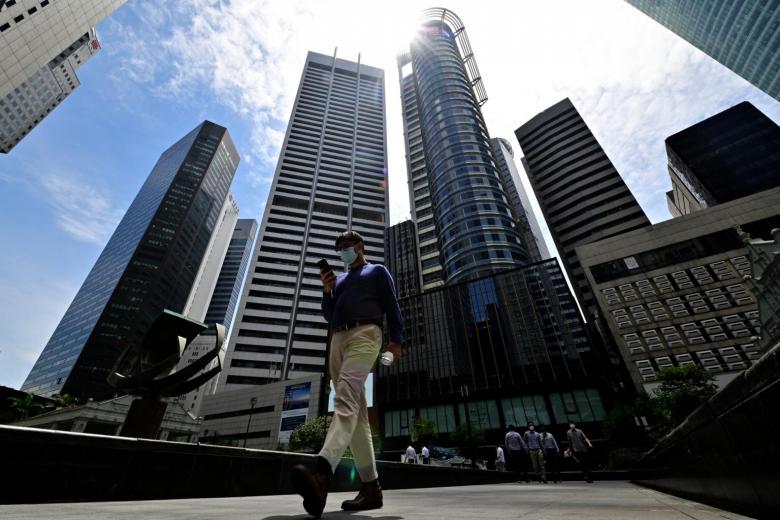SINGAPORE - A new institute here will conduct research and train professionals to become talents in green finance, an area of banking and investment that supports projects that take into consideration climate change and other environmental concerns.
The Singapore Green Finance Centre (SGFC) will tap the strengths of Imperial College Business School and the Lee Kong Chian School of Business at Singapore Management University (SMU) in climate science, financial economics and sustainable investing.
When ready, the centre will offer undergraduate and post-graduate, as well as continuing and professional, education.
The launch of SGFC was announced on Tuesday (Oct 13) at the virtual Financial Times Investing for Good Asia Conference.
The centre is supported by the Monetary Authority of Singapore (MAS) and nine founding partners: Bank of China, BNP Paribas, Fullerton Fund Management, Goldman Sachs, HSBC, Schroders, Standard Chartered Bank, Sumitomo Mitsui Banking Corporation, and UBS Group AG.
In a joint statement, the two academic institutions and MAS said that SGFC's multi-disciplinary research and training will enable financial institutions, corporates and policymakers to improve the management of environmental risks, develop financial solutions to promote environmental sustainability, and design policies for a sustainable future.
MAS managing director Ravi Menon said the Covid-19 pandemic has reinforced the importance of sustainability as it has raised awareness of the importance of taking timely action to mitigate global challenges.
"The immense financing needed to build a greener world can only be met through a combination of public and private capital," said Mr Menon.
He noted that Singapore is now Asean's largest green finance market, accounting for close to 50 per cent of cumulative Asean green bond and loan issuances.
"Notably, sustainable financing and investment flows have held up well through the first half of this year, despite the pandemic and broad-based economic weakness," added Mr Menon.
SGFC aims to equip professionals with skills in climate finance and applied knowledge in Asian markets.
The statement said: "This will develop a strong pipeline of green finance talent which financial institutions and service providers can tap as they expand teams and deepen green finance capabilities to serve the growing needs of Singapore and the region."
The centre will be jointly led by Professor David Fernandez, director of SMU's Sim Kee Boon Institute for Financial Economics, and Dr Charles Donovan, professor of practice and executive director of Imperial College Business School's Centre for Climate Finance and Investment.
An advisory board, comprising MAS, both academic institutions and the nine founding partners, will provide guidance on the centre's strategic direction.
Mr Menon said MAS is committed to developing a vibrant green finance research and talent ecosystem in Singapore to support Asia's transition to a low carbon future.
"The SGFC will be an important part of this ecosystem, bringing together two leading academic institutions in environmental science and financial economics."
Green bonds
In his speech, Mr Menon said Singapore is steadily developing financial solutions to address climate risks. For example, the MAS' Insurance Linked Securities Grant Scheme has seen strong take-up since its launch in 2018.
The scheme funds up to 100 per cent of the upfront costs incurred in issuing catastrophe bonds out of Singapore. These are basically assets that pay insurers if they suffer cataclysmic losses.
Mr Menon noted that within two years, there have been nine catastrophe bond issuances in Singapore.
"This includes the first Asian sovereign and catastrophe bond covering earthquake and typhoon risks in the Philippines," he added.
More than $8 billion in green, social and sustainability bonds have also been issued in Singapore since the introduction of the MAS' Sustainable Bond Grant Scheme in 2017.
The bonds have supported a range of impactful outcomes, including the development of renewable energy projects, improving the energy efficiency of buildings, and financing social enterprises aimed at helping lower-income women.
By the end of this year, MAS will launch a similar grant to support sustainability-linked loans, as companies in Asia rely more on bank loans compared with bonds.
Mr Menon said the grant will fund the costs of conducting external reviews and ratings for green and sustainability-linked loans.
It will also promote the development of sustainable lending frameworks that provide simplified processes and standardised criteria for borrowers.
This will reduce the cost of green borrowing and encourage more small- and medium-sized enterprises to tap such loans, he added.
In a statement, StanChart Singapore chief executive Patrick Lee noted that the Asia-Pacific region needs investments of up to US$ 1.5 trillion (S$2 trillion) a year to achieve the United Nations Sustainable Development Goals by 2030.
"This is an area where Singapore, as a key global financial centre, can make a difference... Climate change is redefining the way we do business and manage risk. We need to quantify the risks better so we can work with clients to devise more robust business models for the future," he said.
Mr Desmond Kuek, divisional vice-chairman for UBS Global Wealth Management, said the bank believes that a 100 per cent sustainable investment portfolio can deliver similar or potentially higher returns compared with traditional portfolios.
He said: "More of our clients are seeing sustainability as an integral part of their business strategy and value system, and that it offers strong diversification to help weather the economic uncertainty and market volatility that will likely persist in the decade ahead."
BNP Paribas Singapore's chief executive Joris Dierckx said the bank will contribute to the SGFC in the areas of transition financing, taxonomy, finance and natural capital, as well as carbon accounting and disclosure.


